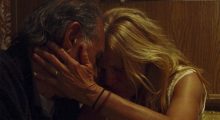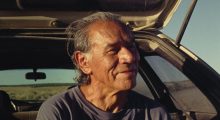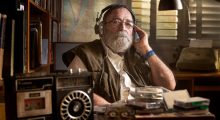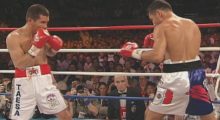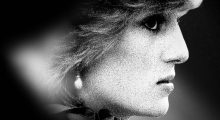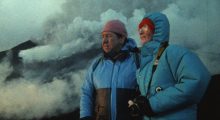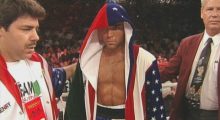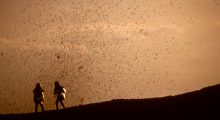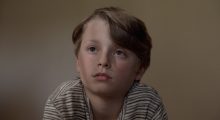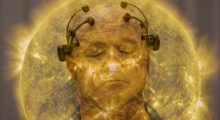Sundance
-
“Acting as Though Something Will Happen Can Take One Darn Close to Doing It” | Max Walker-Silverman, A Love Song

The last two years have prompted much contemplation and reconsideration of the reasons why we make our films as well as the ways in which we make them. What aspect of your filmmaking—whether in your creative process, the way you finance your films, your production methodology or the way you relate to your audience—did you have to reinvent in order to make and complete the film you are bringing to the festival this year? This script had been in my head for a long time, but I didn’t put pen to paper until April of 2020. I’d just graduated from […]
-
“The Rhythm of Nature Many Times Conflicts With the Rhythm of an Independent Production”: DP Alfonso Herrera Salcedo on A Love Song

A Love Song depicts the reconnection and the romance of childhood sweethearts, decades removed from their last meeting. Both widowed now, they use the meeting to reflect on life, love, and loss. It all takes place in an American West that is neither rugged like the films of yesteryear nor depleted like more more recent revisionist takes, but quiet and expansive. Cinematographer Herrera Salcedo explains why 16mm was the right format to capture both characters and the landscapes and how he used the camera to bring the characters to life. Filmmaker: How and why did you wind up being the […]
-
“Jumping and Hugging When a Scene Suddenly Works Amazingly Is Always Much More Fun in the Same Room” | Alon Schwarz, Tantura

The last two years have prompted much contemplation and reconsideration of the reasons why we make our films as well as the ways in which we make them. What aspect of your filmmaking—whether in your creative process, the way you finance your films, your production methodology or the way you relate to your audience—did you have to reinvent in order to make and complete the film you are bringing to the festival this year? I think the biggest challenge was the communications cycle with the offline video editors when not working locally. I started working remotely as my first editor, […]
-
“At the Root of This Rivalry Is a Historical Conflict Between Mexican Nationals and Mexican-Americans”: Editor Luis Alvarez y Alvarez on La Guerra Civil

Julio César Chávez and Oscar de la Hoya were once two of the biggest names in boxing, and their 1996 bout dubbed “Ultimate Glory” was a flashpoint for the divide between Mexican-Americans and Mexican nationals. Mixing archival footage with interviews of the boxers themselves, <i>La Guerra Civil</i> examines the bout, the rivalry and its cultural dimension. Editor Luis Alvarez y Alvarez discusses his memories of the fight and how the filmmakers were able to recapture and illuminate one of the defining sports moments of the 1990s. Filmmaker: How and why did you wind up being the editor of your film? […]
-
“We Wanted to Target an Audience Not Necessarily Interested in the Royal Family”: Editors Jinx Godfrey and Daniel Lapira on The Princess

From the beginning, director Ed Perkins knew he wanted to tell Princess Diana’s story without any retrospective interviews and instead rely purely on archival material. That’s a rich archive, consisting of thousands of hours of footage, meaning the editors would need to choose among countless potential approaches or narrative threads. Below, editors Jinx Godfrey and Daniel Lapira discuss what drew them to the film and how they managed to whittle thousands of hours of footage into a 104-minute feature film. Filmmaker: How and why did you wind up being the editor of your film? What were the factors and attributes […]
-
“The Pandemic Sparked a Deeper Contemplation Into Our Creative Process” | Sara Dosa, Fire of Love

The last two years have prompted much contemplation and reconsideration of the reasons why we make our films as well as the ways in which we make them. What aspect of your filmmaking—whether in your creative process, the way you finance your films, your production methodology or the way you relate to your audience—did you have to reinvent in order to make and complete the film you are bringing to the festival this year? Fire of Love is the first archival film I’ve ever directed—my previous two independent films I directed were primarily vérité. Fire of Love producer Shane Boris, assistant producer […]
-
“It Was Really Important That I Was Able to Lean Into the Intimacy of Interviewing My Subjects and Not Just Rely on Archival Footage” | Eva Longoria Bastón, La Guerra Civil

The last two years have prompted much contemplation and reconsideration of the reasons why we make our films as well as the ways in which we make them. What aspect of your filmmaking—whether in your creative process, the way you finance your films, your production methodology or the way you relate to your audience—did you have to reinvent in order to make and complete the film you are bringing to the festival this year? Given the nature of La Guerra Civil, it was really important that I was able to lean into the intimacy of interviewing my subjects and not […]
-
“I Came Out of This Process With a Refreshed Perspective on Mortality”: Editors Erin Casper & Jocelyne Chaput on Fire of Love

Two of the best known volcanologists, Katia and Maurice Krafft—are arguably as well known for having died in an expedition on Japan’s Mount Unzen, but Fire of Love, a documentary by Sara Dosa that makes use of the footage shot by the couple, turns away from the easy tragic narrative to instead shine a light on the love they shared for their work as well as for each other. Editors Erin Casper and Jocelyne Chaput explain how they put together a film from footage that was often difficult to parse and why they took inspiration from the French New Wave. […]
-
Trailer Watch: Ricky D’Ambrose’s The Cathedral

Following its premiere at last year’s Venice Film Festival, The Cathedral, the sophomore feature by Ricky D’Ambrose (a 25 New Face of Film in 2017), makes its US premiere at this year’s Sundance. We’re pleased to share the first trailer for the film, an assured, highly compressed yet emotionally impactful portrait of a young man’s upbringing from early ‘80s childhood to late ‘10s college. D’Ambrose’s coming-of-age story boasts David Lowery as an executive producer. The film’s Sundance page is here, and D’Ambrose’s essay about acting as his own graphic designer is here.
-
“Not Addressing the Core Exploitations of Capitalism is Essential to Capitalism’s Survival”: Theo Anthony on His Surveillance Doc, All Light, Everywhere

This interview with Theo Anthony about his documentary, All Light, Everywhere, was originally published alongside the film’s premiere at the 2021 Sundance Film Festival. It is being reposted today as the film premieres in theaters, including, in New York, at the IFC Center, where Anthony will do Q&As moderated by Brenda Coughlin and Sierra Pettengill. In All Light, Everywhere’s opening shot, filmmaker Theo Anthony turns the camera lens on his optic nerve, as text narration explains that we’re blind at the point where the optic nerve and retina connect—there’s a fundamental hole in our ability to view the world that, Anthony […]
